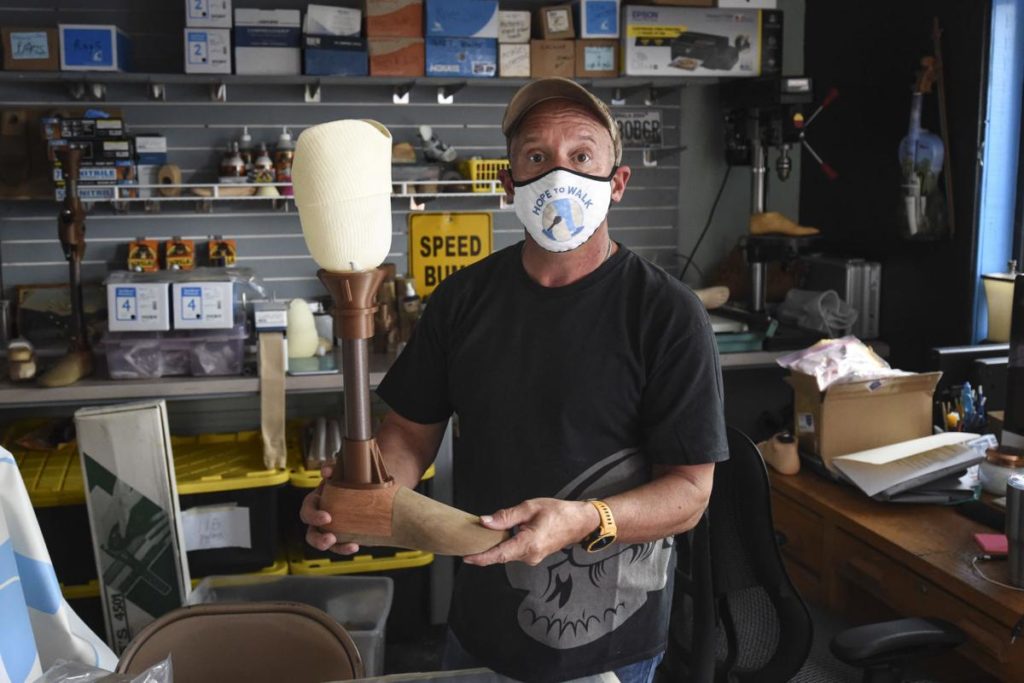BLACKSBURG — Feet and legs were scattered around a crowded room on South Main Street on a recent Tuesday afternoon, and the sound of saws and hammers echoed from deep inside the building.
This is the expanding headquarters of Hope to Walk, a nonprofit dedicated to building low-tech, low-cost prosthetic legs for the world’s poorest amputees. And for several weeks now, volunteers have been remodeling the group’s facilities to make room for expanded training and manufacturing.
Over the past six years, professional prosthetist Phil Johnson has developed a $100 below-the-knee prosthetic device that has allowed Hope to Walk put more than 600 adults and children back on their feet in Honduras, Guatemala, Haiti, Vietnam and the Bahamas.
But this year, the global coronavirus pandemic has put a hitch in the group’s step.
Normally volunteers would be flying off for weeklong trips to fit legs for the needy and train locals to continue that work. But the group has been grounded since February, Marketing Director Kristen Staples said.
A trip to fit new prosthetics that was set for March was canceled, and a wall calendar of the groups’ events has been written over in red letters: COVID. One of those, a 5K fundraiser, had been scheduled in Johnson City, Tennessee, where a group of supporters lives, she said. Its cancellation seemed at first to be a setback but now has created a new opportunity.
Hope to Walk has made the 5K a virtual project and hopes to raise at least $50,000 with the effort, but more importantly, they hope to cultivate as much global awareness as they can, Staples said.
Participants are asked to register as individuals or groups at Hope to Walk’s website, make a donation and on Aug. 8-9 run, walk or roll 3.1 miles in support of more than 30 million amputees worldwide who lack access to prosthetics, according to World Health Organization estimates. Registration is free and all donations are accepted.
Staples said participants are asked to post photos and videos of their 5K journey on social media using #wewalksotheycan.
“Anyone can participate, any way they want to participate, any time during that weekend, anywhere they are,” Staples said.
Johnson said he’s going to do his miles in as many different ways as possible, perhaps including his mountain unicycle, which he actually rides down mountains, he said.
The group will still organize in-person 5K events in the future, but they may be held in conjunction with a virtual event, Staples said.
“I actually do think this is the model going forward. Our story is compelling to people not just in Southwest Virginia,” Staples said. “I want to make sure someone in Oregon knows about us, and somebody in Bangladesh — wherever they are.”
The event has so far drawn registrations from the U.S., Spain and Paraguay and has already raised more than $35,000, Staples said.
That money can go a long way in the developing world.
The commercial prosthetics that Johnson makes for clients out of his Blacksburg business, New River Valley Orthotics and Prosthetics, can cost $10,000 to $25,000, he said.
For an average Honduran who makes the equivalent of a few dollars for a whole week’s work, there’s no hope of ever buying a commercial one, Johnson said. And in many developing countries, without prosthetics, amputees can’t work, go to school or care for their families.
Hope to Walk builds Johnson’s simple device using donations to pay for the materials, and its volunteers fit them to needy people in the countries where they live. For every $50,000 the group raises, Johnson said Hope to Walk can provide free prosthetics to about 150 people.
The expansion of the organization’s space coincides with efforts to expand both its reach and its line of devices. Johnson said he’s working on a prosthetic leg with a simple articulated knee that he hopes to build for $200 each. Staples said the group has a long waiting list for a such a prosthetic in Honduras alone.
Johnson also has begun work on prototypes for a prosthetic arm with a simple grasping device — something he said amputees working as rural farmers in the developing world could really use.
Helping struggling amputees is life-changing, Staples said. And not just for the recipients.
“It’s really quite addictive when you see those people stand up and walk,” she said.
Staples joined the group two years ago and has since given up her photography business in Northern Virginia to move to Blacksburg to do marketing, social media and Spanish-language translating for Hope to Walk.
To register for the Hope to Walk Virtual 5K, visit https://hopetowalk.donordrive.com.
by Tonia Moxley

